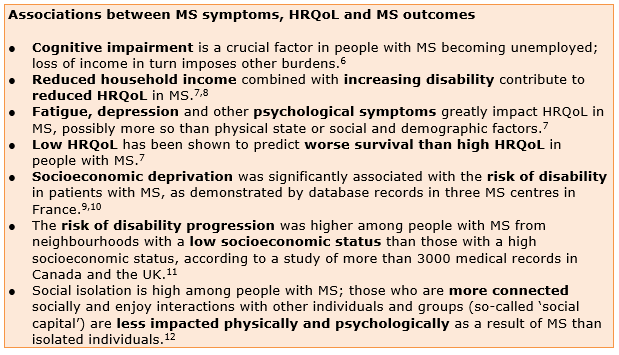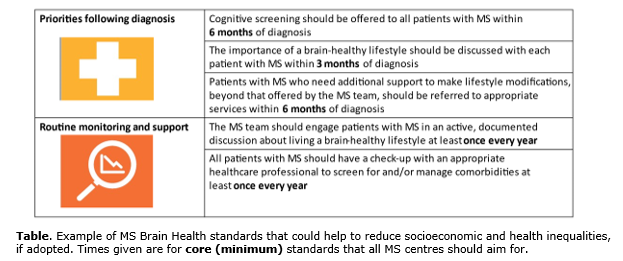Social determinants of health: impact on multiple sclerosis outcomes
Summary by Stanca Potra1 and Gavin Giovannoni2
1MS Ambassador for European Multiple Sclerosis Platform and Member of MS in the 21st Century Steering Group, Romania; 2Professor of Neurology, Blizard Institute, Barts and The London School of Medicine and Dentistry, UK, and Chair of MS Brain Health Steering Committee
Global inequalities in socioeconomic factors
Socioeconomic factors play a significant role in our daily lives, our lifestyle choices and our overall satisfaction within society. The term ‘social determinants’ in relation to health describes some of these factors that contribute to health-related quality of life (HRQoL) and to health outcomes. Health inequities exist globally owing to unequal access to wealth, education and health facilities.1
High-income countries generally have a higher prevalence and incidence of MS than countries with fewer economic advantages; this may be due to disease awareness, access to diagnostic facilities and early diagnosis being more widespread in the former.2
Relationship between socioeconomic factors and MS outcomes
Socioeconomic factors may have a particularly negative impact on people with MS because the disease affects the entire family3 and requires adjustments in the workplace, regular visits to doctors, check-ups, expensive investigations, and lifelong treatment. Research has demonstrated some clear associations between MS symptoms, HRQoL (influenced by social determinants of health) and MS outcomes.4,5

How do MS Brain Health standards impact social determinants of health?
The above findings have important implications for planning and development of MS services.11 Patients with higher socioeconomic status may have better access to high-quality care, better social support, eat healthier foods or have healthier lifestyles than those with lower socioeconomic status. These issues need to be studied so that programmes and policies can address the needs of all patients with MS.13
The consensus standards developed from the MS Brain Health recommendations represent a set of globally agreed goals; these provide a means of standardizing some of the inequalities resulting from social determinants (Table).

Healthcare professionals can also help to decrease the impact of modifiable factors on HRQoL in people with MS by identifying those with depressive symptoms and/or cognitive impairment and initiating evidence-based treatment.8 Better knowledge of socioeconomic disparities in MS may help tailor care to settings, improve care quality and promote social interventions to improve outcomes.9
References
1. World Health Organization. Social determinants of health. Report of a regional consultation, Colombo, Sri Lanka, 2–4 October 2007. Available from: https://apps.who.int/iris/bitstream/handle/10665/206363/B3357.pdf (Accessed September 2021).
2. Moghaddam VK, Dickerson AS, Bazrafshan E et al. Socioeconomic determinants of global distribution of multiple sclerosis: an ecological investigation based on Global Burden of Disease data. BMC Neurology 2021;21:145.
3. Messmer Uccelli M. The impact of multiple sclerosis on family members: a review of the literature. Neurodegener Dis Manag 2014;4:177‒85.
4. Hanna M, Strober LB. Anxiety and depression in multiple sclerosis: antecedents, consequences, and differential impact on well-being and quality of life. Mult Scler Relat Disord 2020;44:102261.
5. Lorefice L, Fenu G, Frau J et al. The impact of visible and invisible symptoms on employment status, work and social functioning in multiple sclerosis. Work 2018;60:263‒70.
6. Langdon D. Cognition in multiple sclerosis. Curr Opin Neurol 2011;24:244–9.
7. Biernacki T, Sandi D, Kincses ZT et al. Contributing factors to health-related quality of life in multiple sclerosis. Brain Behav 2019;9:e01466.
8. Chruzander C, Ytterberg C, Gottberg K et al. A 10-year follow-up of a population-based study of people with multiple sclerosis in Stockholm, Sweden: changes in health-related quality of life and the value of different factors in predicting health-related quality of life. J Neurol Sci 2014;339:57–63.
9. Calocer, F. et al. Socioeconomic deprivation increases the risk of disability in multiple sclerosis patients. MSARD 2020;40:101930.
10. Hillert J. Socioeconomic status and multiple sclerosis outcome. Nature Rev Neurol 2020;16:191–2.
11. Harding KE, Wardle M, Carruthers R et al. Socioeconomic status and disability progression in multiple sclerosis: A multinational study. Neurology 2019;92:e1497–e1506.
12. Reyes S, Giovannoni G, Thomson A. Social capital: Implications for neurology. Brain Behav 2019;9:e01169.
13. Conway DS. What is the impact of socioeconomic status on multiple sclerosis? (Patient page.) Neurology 2019;92:e1536–e1539.
